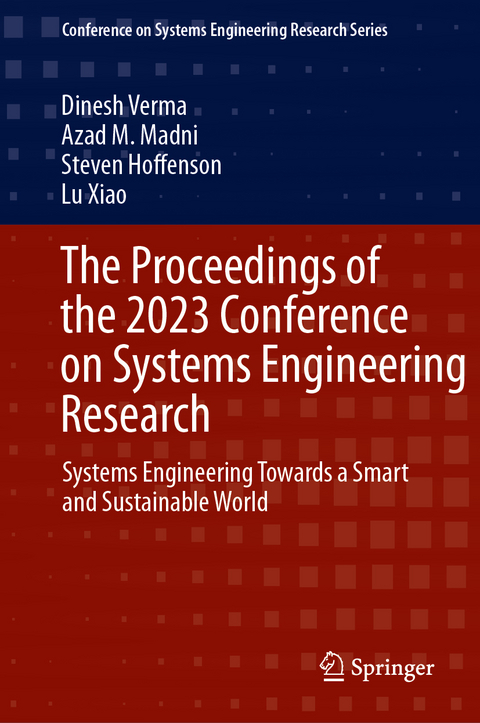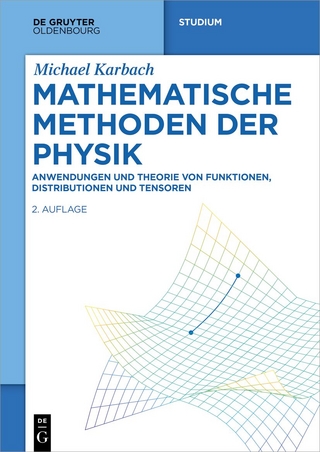
The Proceedings of the 2023 Conference on Systems Engineering Research
Springer International Publishing (Verlag)
978-3-031-49178-8 (ISBN)
The 20th International Conference on Systems Engineering Research (CSER 2023) pushes the boundaries of systems engineering research and responds to new challenges for systems engineering. CSER 2023 invited researchers and practitioners to submit their work in alignment with the thematic focus on a smart and sustainable world. CSER was founded in 2003 by Stevens Institute of Technology and the University of Southern California, and in 2023 the conference returned to the Stevens campus in Hoboken, New Jersey.
lt;p>Dinesh Verma served as the Founding Dean of the School of Systems and Enterprises at Stevens Institute of Technology from 2007 through 2017. He currently serves as the Executive Director of the Systems Engineering Research Center (SERC), a US Department of Defense sponsored University Affiliated Research Center (UARC) focused on systems engineering research. During his fifteen years at Stevens he has successfully proposed research and academic programs exceeding $175m in value. He has a courtesy appointment as a Visiting Professor in the Department of Biochemistry in the School of Medicine at Georgetown University. Verma served as Scientific Advisor to the Director of the Embedded Systems Institute in Eindhoven, Holland from 2003 through 2008. Prior to this role, he served as Technical Director at Lockheed Martin Undersea Systems, in Manassas, Virginia, in the area of adapted systems and supportability engineering processes, methods and tools for complex system development.
Azad M. Madni is a University Professor of Astronautics, Aerospace and Mechanical Engineering and Executive Director of USC's Systems Architecting and Engineering Program in the Viterbi School of Engineering. He is also the founding Director of the Distributed Autonomy and Intelligent Systems Laboratory at USC. He is a member of the National Academy of Engineering and the recipient of the NAE's 2023 Bernard M. Gordon Prize for Innovation in Engineering and Technology Education. He is also a Life Fellow of IEEE and recipient of the 2023 IEEE Simon Ramo Medal. In 2020, he received the IEEE SMC's Norbert Wiener Outstanding Research Award. His other systems engineering awards include the 2021 Joint ASEE SED/INCOSE Outstanding Systems Engineering Educator Award, the 2011 INCOSE Pioneer Award, the 2019 IEEE AESS Pioneer Award, and the 2020 NDIA Ferguson Award. He is the recipient of the 2023 ASME CIE Lifetime Achievement Award and is Honorary Member of ASME. He is the author of Transdisciplinary Systems Engineering: Exploiting Convergence in a Hyperconnected World (Springer, 2018). He is the Co-Editor-in-Chief with Norm Augustine of the Handbook of Model Based Systems Engineering (Springer, 2023). He serves on the Advisory Board of the London Digital Twin Research Centre and is a faculty affiliate of USC's Ginsberg Institute of Biomedical Therapeutics. He is a Life Fellow/Fellow of ten different science and engineering societies including IEEE, INCOSE, IISE, AIAA, and AAAS. His research interests are digital twin-enabled MBSE, augmented intelligence applications in systems engineering, and transdisciplinary engineering education. He has served as Principal Investigator on 98 R&D contracts and grants totalling more than $100M. He received his Ph.D., M.S., and B.S. degrees in Engineering from UCLA
Steven Hoffenson is the Director of Data Science at Endevor, an enterprise software company that focuses on process automation for asset-intensive industries. Prior to joining Endevor, Dr. Hoffenson spent 15 years as an academic researcher and professor, where he published over 65 peer-reviewed manuscripts focused on product development, systems engineering, sustainability, and numerical optimization. His most recent academic position was in the School of Systems and Enterprises at Stevens Institute of Technology, where he directed the Design of Sustainable Products Across Complex Environments (Design SPACE) Laboratory. Dr. Hoffenson holds degrees in Mechanical Engineering from the University of Michigan (Ph.D. and M.S.E.) and the University of Maryland (B.S.).
Lu Xiao is an Assistant Professor in the School of Systems and Enterprises at Stevens Institute of Technology. Her research interests lie in the broad area of software engineering, particularly in software architecture, software economics, cost estimation, and software ecosystems. She
Part I-Model-based systems engineering. .- Chapter 1. PySysML2: Building Knowledge from Models with SysML v2 and Python.- Chapter 2. Model-Based Verification Strategies Using SysML and Bayesian Networks.- Chapter 3. MBSE-based design space exploration for productivity improvement using workflow models.- Chapter 4. Using JSON Schema to define a system modeling vocabulary: The Tradespace Analysis Tool for Constellations (TAT-C).- Part II-Digital engineering. .- Chapter 5. Framework for and progress of adoption of digital and model-based systems engineering into engineering enterprises.- Chapter 6. Towards developing a digital-enabled mission engineering framework.- Chapter 7. Digital Twin Use Case for Smart, Sustainable Cities.- Chapter 8. Advancing Education on Digital Acquisition Artifacts.- Part III-System modularity. .- Chapter 9. Modularity Matters - Making Products Open is Only Half the Battle.- Chapter 10. Modeling Aspects of Dynamically Reconfigurable System of Systems.- Chapter 11. Technology Infusion in Spacesuits - A Comparative System Analysis.- Chapter 12. A Framework on Early Decoupling Level Metric Assessment based on NLP4RE.- Part IV-Knowledge management and verification. .- Chapter 13. Summary Outcome: Study of Equivalence in Systems Engineering within the Frame of Verification.- Chapter 14. Verification Complexity: An Initial Look at Verification Artifacts.- Chapter 15. Building a Resilient Systems Engineering Workforce with Knowledge Intelligence Transduction (KIT).- Part V-Testing, verification, and validation. .- Chapter 16. Introducing Technical Debt link to Leading Indicators in Test and evaluation phase of Systems Engineering - a thought experiment.- Chapter 17. An Integrated Testbed for Supporting Sustained Military Installation Decision Making and Modernization.- Chapter 18. Can measurement misdirect system design?.- Chapter 19. Technical concept development, testing and modeling: development of a Shape Memory Alloy (SMA) Tire-Insert for flat tire prevention and airless conversions.- Part VI-Graph/network methods. .- Chapter 20. Using graph theory to investigate the role of expertise on infrastructure evolution: A case study examining the game Factorio.- Chapter 21. Graph Representation of System of Analysis in Determining Well-Formed Construction.- Chapter 22. Product Competition Analysis for Engineering Design: A Network Mining Approach.- Part VII-Software engineering. .- Chapter 23. System Engineering Driven AI Assurance and Trustworthiness.- Chapter 24. How is Software System Reuse Discussed in Stack Overflow?.- Chapter 25. Smart base installations: applying systems engineering techniques to the agile development of multidisciplinary systems of systems projects..- Part VIII-AI and smart systems. .- Chapter 26. Analysis of IoT Privacy Policies in Smart Transportation Systems.- Chapter 27. Product Herding for Intelligent Systems.- Chapter 28. Early Implementation of a Cognitive Assistant for Identifying Requirement Gaps.- Part IX-Value-based engineering case studies. .- Chapter 29. An Interactive Dashboard to Support Design of an Artillery System.- Chapter 30. Tackling optimization and system driven engineering in coupling physical constraints with MBSE: the case of a Mobile autonomous line of products.- Chapter 31. Risk-informed prioritization for complex engineered systems: Two US Army Corps of Engineers case studies.- Chapter 32. Exploring differences in value functions allowed by ordinal validation.- Part X- User behavior in complex systems. .- Chapter 33. Identifying and Evaluating the Effects of User Scenarios on the Data Integrity of Wearable Devices.- Chapter 34. An Experimental Study of the Effect of Monetary Incentives and Fees on Consumer Energy Behavioral Intentions.- Chapter 35. A framework for agent-based models to consider energy justice through technology adoption.- Chapter 36. Network-Based Analysis of Heterogeneous Consideration-then Choice Customer Preferences with Market Segmentations.- Part XI-Systems thinking case studies. .- Chapter 37. Systems Thinking Design in Action - A Duplicated Novel Approach to Define Case Studies.- Chapter 38. A Systems Thinking Understanding of Teamwork Competencies and Their Relationship to Health System Outcomes.- Chapter 39. Applying Systems Science to Applied Science.- Part XII-Sustainability case studies. .- Chapter 40. Ecological Decentralization for Improving the Resilient Design of Urban Water Distribution Networks.- Chapter 41. Resilient Microgrid Design Using Ecological Network Analysis.- Chapter 42. Optimization of the System of Systems (SoS) Meta-Architecture of Algae Systems for cost-effective pollution remediation.- Chapter 43. Sustainable Design of a Reusable Water Bottle: A Systems Thinking Approach.- Part XIII-Systems engineering reviews and expertise. .- Chapter 44. Context-Dependent Research Agenda for Systems Engineering in 2050.- Chapter 45. How to identify an engineer with the appropriate systems thinking skills?.- Chapter 46. The Emphasis of Design Patterns in Expressing Expert Knowledge from a Technical Solution - A Framework for Continued Research.- Chapter 47. Literature Review and Research Design for Systems Integration: Case study in Defense Systems.
| Erscheinungsdatum | 28.03.2024 |
|---|---|
| Reihe/Serie | Conference on Systems Engineering Research Series |
| Zusatzinfo | XI, 710 p. 252 illus., 223 illus. in color. |
| Verlagsort | Cham |
| Sprache | englisch |
| Maße | 155 x 235 mm |
| Themenwelt | Mathematik / Informatik ► Mathematik ► Angewandte Mathematik |
| Technik | |
| Schlagworte | Artificial Intelligence • machine learning • Smart Technology • Sustainable Systems • Systems Engineering |
| ISBN-10 | 3-031-49178-5 / 3031491785 |
| ISBN-13 | 978-3-031-49178-8 / 9783031491788 |
| Zustand | Neuware |
| Haben Sie eine Frage zum Produkt? |
aus dem Bereich


